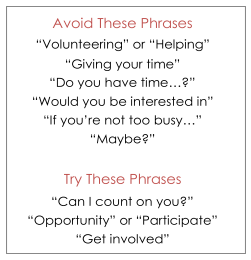
Changing
The State
Building a Volunteer Team
Volunteer Recruitment Tips
Volunteer recruitment is the most important skill that can be developed and refined by a grassroots leader. Recruitment and retention require us to step outside of our comfort zone and establish a personal relationship with every volunteer.
Retaining a satisfied, engaged participant is far less time consuming than replacing or re-recruiting a burned-out volunteer.
Tips for Recruiting First Time Volunteers
- Make a point to always be friendly and approachable. While you may live the issues every single day, a volunteer prospect has likely never participated in an advocacy campaign.
- Be earnest. Make sure your volunteer prospect knows how critical what you’re asking them to do is, how it will help us win for our values, and why it must be done now instead of next month.
- Spend time getting to know each other on a personal level. They are less likely to skip a shift or avoid a phone call if it’s coming from a personal friend.
- Listen closely to every new volunteer’s story and focus on discovering your shared motivations for being involved in the campaign.
- Always make your ask firm and clear. A hard ask only works if it’s for a specific event, time, and place.
- Follow-up at least once, twice, preferably with an “I’m really looking forward to seeing you on X day at X time. Could you bring a friend along as well?” type call or email. We are in the people business -- be personable.
- Always send a calendar invite through google calendar or another service to the attendees.
- Always thank the volunteer upon task completion, debrief them to review their experience, and let them know that you’ll be following up soon to discuss their next shift. There’s no such thing as a “one and done” volunteer.

Recruitment Cold Calls
- Always strive to make a personal connection within 30 seconds
- Always be positive. Everything is awesome!
- Instill a sense of urgency in the prospect.
- Always end calls with a Hard Ask.
- WAIT for a response (for as long as 30 seconds).
Key Components of a Hard Ask
- Update: Give your ask context. What is the organization up to today? What’s going on that’s so important?
- Convey a sense of urgency!: Why now and not next month? How will this work directly influence policy outcomes?
- Present a clear challenge: How many voters do we need to ID this week? What’s the registration gap in their neighborhood? What happens if we don’t register them this week?
- Present the obvious solution: FYI- The volunteer is ALWAYS the solution. “We’ll never have all the volunteers we need, and there are never enough votes to guarantee a win.”
- Be detailed, honest, and action-oriented: Always end with a specific action item. Include a time and place, i.e. “We’re registering voters this Thursday at 12:00 p.m. outside the fair. Can you participate?”
Volunteer Development Tools
One on One Meetings (1:1)
One on One Meetings are intentional, pre-scheduled meetings with a volunteer or a potential volunteer to discuss the organization, plan work to be done, or debrief completed actions. When it comes to volunteer development, there is no substitute for direct person-to-person interaction. Personal interaction and shared experience establish the strongest bonds and provide the most compelling incentive for engagement. This is why one on one meetings are a bedrock organizing technique for bringing new volunteers onto teams, for developing volunteer leaders, and for maintaining relationships with active volunteers.
Best Practices
- 1:1s are scheduled in advance and last 45-60 minutes
- Once scheduled, make sure you put it on your schedule and a place to track it
- Be prepared to make a Hard Ask at the end of the meeting
- Tracking is critical for 1:1 meetings so you know how your outreach is progressing
- Make sure to do all necessary follow-up
House Meetings
A house meeting is simply that, a meeting in a home, business, or office with 8-12 attendees invited by the volunteer host. Attendees are often neighbors, family, friends, etc. who live within your turf and can be recruited to join the team. Learn more about house meetings here.
Door to Door
Person-to-person voter contact is the most important form of voter contact that a campaign can perform. Organizing a door-to-door team for a specific event is a great way to build a team’s capabilities. Learn more about hosting a door-to-door canvassing event here.
Phone Banking
In the same way that door-to-door voter contact is a key component of a volunteer team’s role, phone banking is also a critical tool. Learn more about hosting a phone bank here.
Put It Into Action
Now you are ready to expand your network and act as a leader in your community. Change will come to Illinois, but only if we each work to bring more people into our movement. Sign up here to host a canvass and we’ll follow up to walk you through each step.





